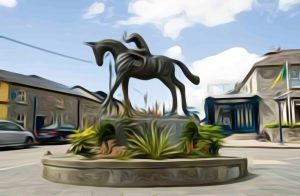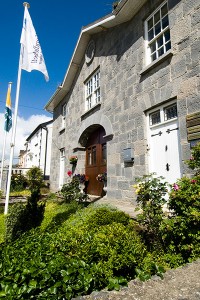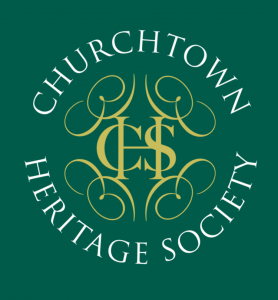THE WILL OF HENRY, 5TH EARL OF EGMONT
We are told hoe Earl Henry, who never married, was a rake, a drunk and a spender, squandering his income as it came into his hands and then borrowing heavily from Edward Tierney. Earl Henry died on December 23, 1841 leaving by his will all his estates in England and Ireland to his agent and solicitor, Edward Tierney, cutting out his heir and cousin, Lord Arden who only received the empty title of Earl of Egmont.
Tierney was then owner of the Egmont Estates with a yearly rental of £30,000. Sir Matthew Tierney, Edward’s brother died around that time and having no children the title passed to Edward with more property valued at £40,000. From that day Edward became known as Sir Edward Tierney.
CHURCHTOWN HOUSE
On succeeding to the property Sir Edward Tierney took up residence at Churchtown House, a large mansion and demesne just off the Village Street. He also had a large town house at 15 Lower Fitzwilliam St, Dublin. On the Churchtown estates he laid out farms and built excellent farm houses all still visible in and around Churchtown. These improvements entailed much suffering for to enlarge the farms he cleared out many small tenants and cottiers who were forced to board the coffin ships and sail to America and Australia. We do not know anything about the son of Sir Edward who was named Percival Tierney he may have died young but when Sir Edward Tierney died in 1856 all the Egmont estates were left by will to Tierney’s son-in-law, Rev Sir Lionel Darrell. Everything went without a hitch for some years until 1861 when John, 6th Earl of Egmont, commenced an action to break the will of Earl Henry. The case came before the Cork Assises in 1863.
THE LAW CASE DARRELL V EGMONT
On opening the case for Sir Lionel Darrell, Dr Ball afterwards Lord Chancellor described the testator, Earl Henry as a man sunk in pecuniary habits and unfortunately an addict to intemperance. However, he had great mental acuteness and business habits. The will he made was a most natural one. He had no near relations, neither sister or brother. The next heir was his cousin Lord Arden of whom he knew nothing. Dr Ball stated how the Egmont Estates were worth practically nothing until they bore their present high value owing to the care and expenditure laid out by the agent, Sir Edward Tierney.
Mr Brewster opening the case for the Earl of Egmont, pointed out some inaccuracies in Dr Ball’s speech and then went on to sketch the sad history of Henry, 5th Earl of Egmont. He was neglected as a boy never sent to high school, or university. His mother hopelessly ruined him by inducing him, when he came of age, he signed a sheaf of deeds and bills, by which he made himself liable for the debts of his ancestors. From that moment he was a ruined man. The inheritance of the title a few years before his death saved him from going to prison. He was most of the time under the influence of drink. He was often to be found in a wild state in a low place known as Smith’s Hotel drinking with bums and hostlers.
He wrote shoals of letters to Sir Edward Tierney which always read the same, send me money, send me £500 or send me £300. One letter read, send me for Gods sake £100. Earl Henry signed every document Tierney put before him, which Mr Brewster stated no sane man would sign. Earl Henry returned from a trip to Europe, a dying man, ruined in body and mind. I will tell you now stated Mr Brewster in Court how Sir Edward Tierney, procured from the dying man the will by which Tierney was left everything.
In the making of that will three persons were concerned, the Earl, he, of course, is dead, Sir Edward Tierney, he is dead and Mr Parkinson, a solicitor. We will now hear said Mr Brewster the extraordinary story which Mr Parkinson will give you an Oath. The trial which was then on it’s fourth day came to an abrupt ending at that stage the court rose for lunch. When the court resumed it was announced that a juror was ill and the court was adjourned to the next day. The following day the juror was still ill.
After much conference Mr Brewster rose to say that the case had been settled. Mr Parkinson was never called and Mr Brewster never finished his speech. The Earl of Egmont got his estates and Rev Sir Lionel Darrell got £125,000 and costs.
Around 1895 the Earl of Egmont sold his estate to the tenants under the Ashbourne Act and thus after three hundred years ended the connection of the great house of Percival with Churchtown and County Cork.




